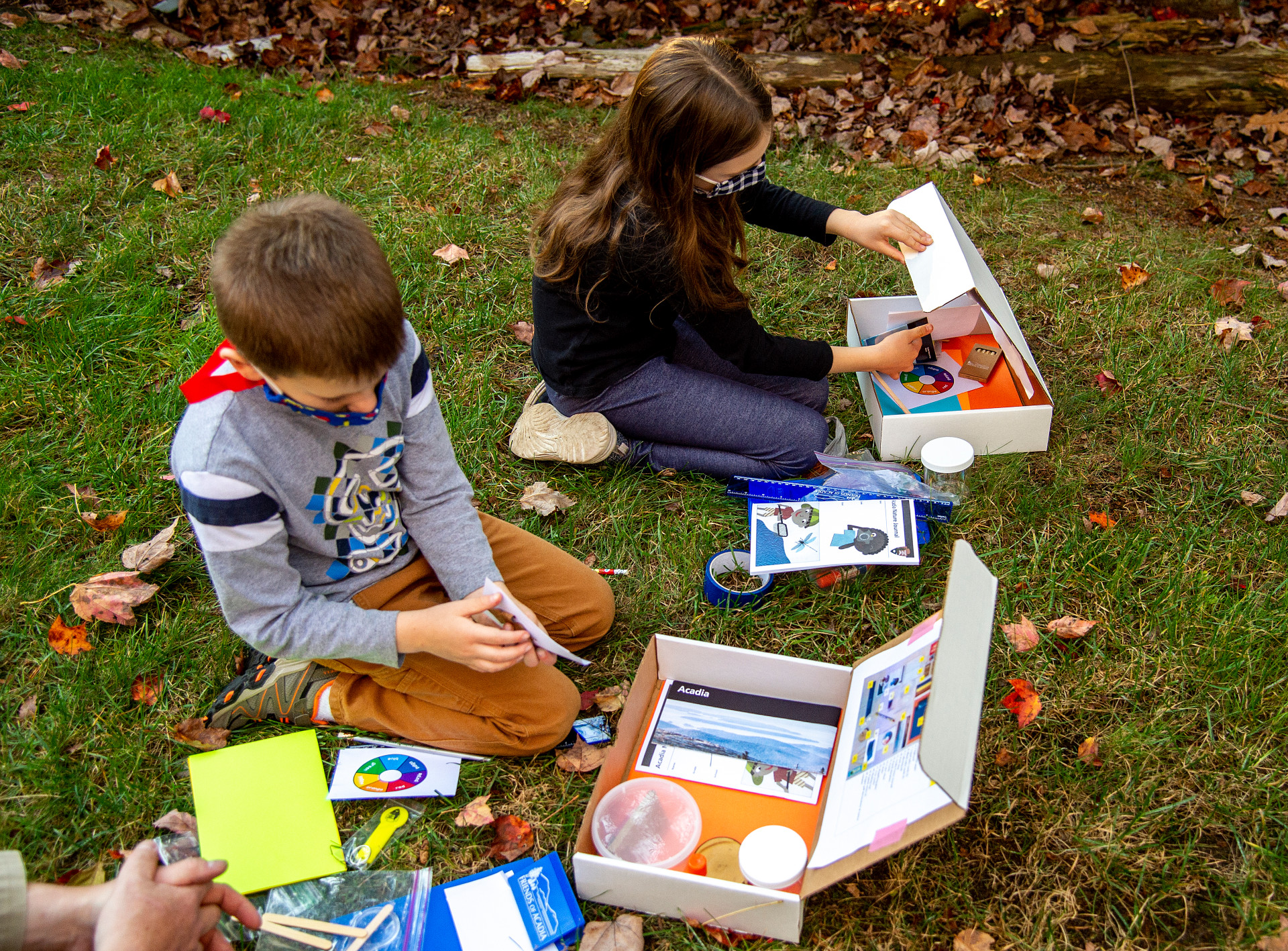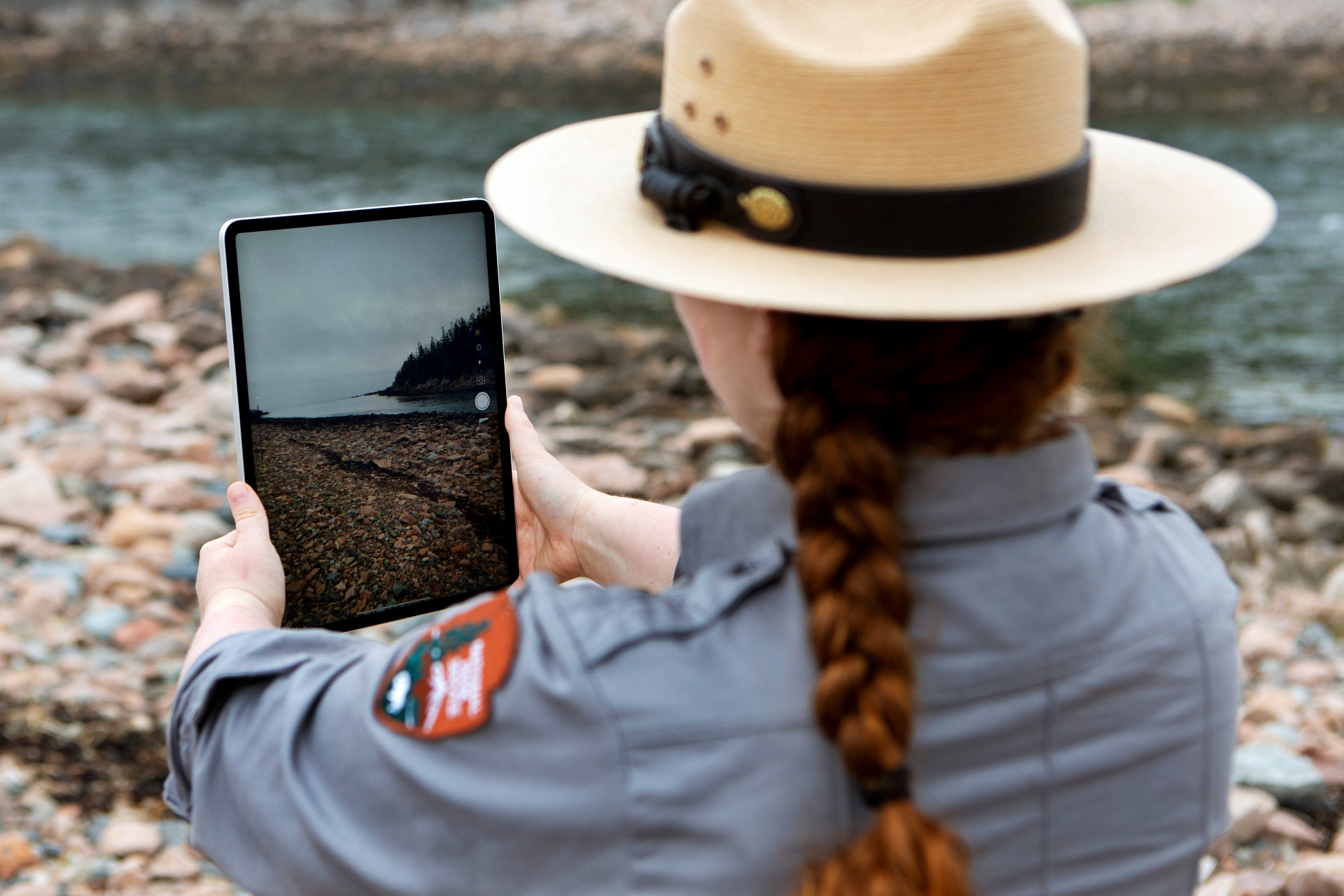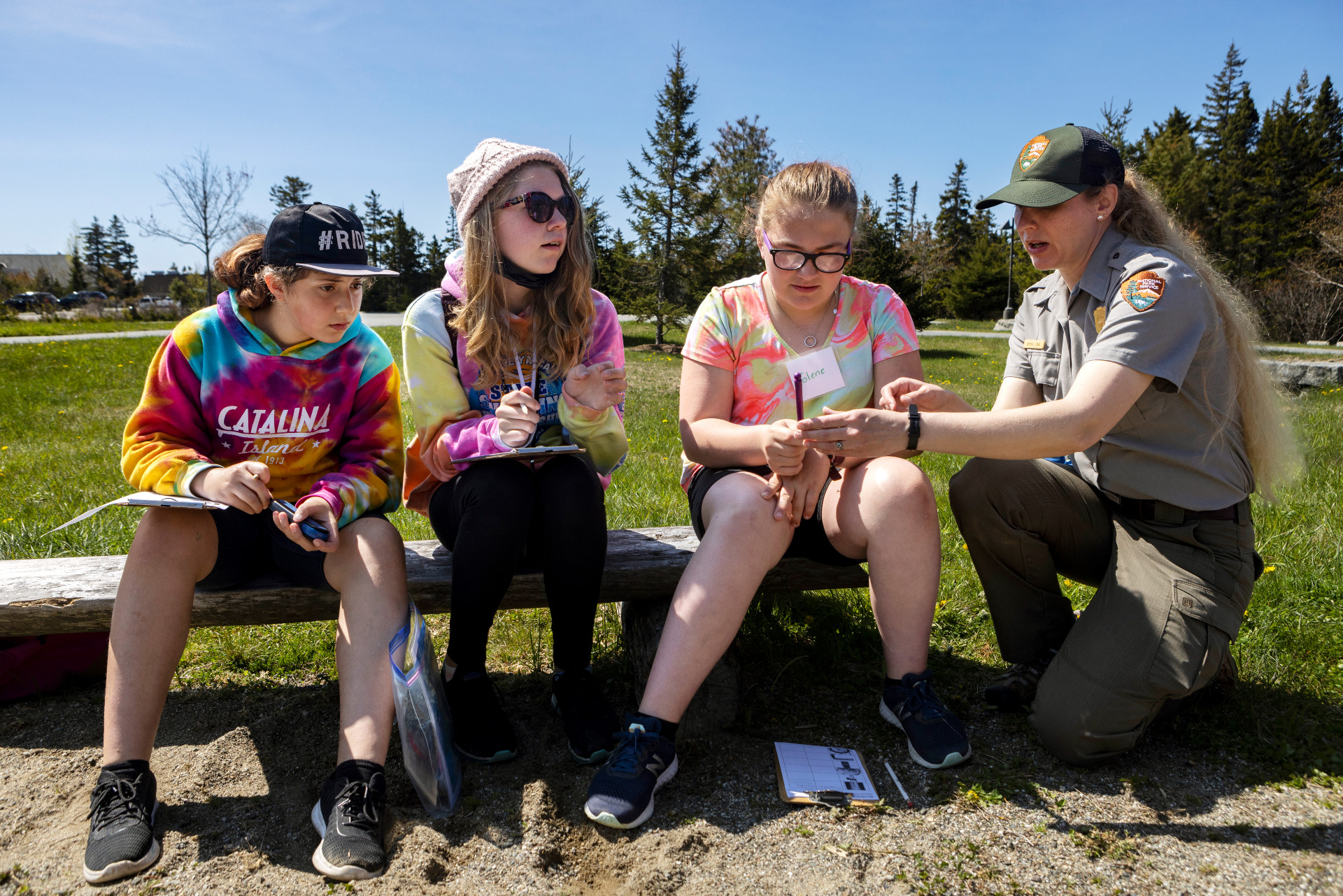Creating Tomorrow’s Stewards Through a Creative Blend of Virtual, Self-guided, and In-person Programming
August 2nd, 2022
August 2nd, 2022

Grayson Staggs and Molly Tadenev, both 7, use their Nature Study Kits in Bar Harbor. (Photo by Will Newton/Friends of Acadia)
By SHANNON BRYAN
Acadia National Park’s education rangers are reaching students near and far with a creative blend of in-person explorations, teacher-led visits, and virtual programs that engage and inspire the next generation of park stewards.
This year, the park welcomes classrooms back for “hands on, feet-in” field trips, where students can investigate animal habitats, examine ecosystems, and explore the topic of human change in the environment with one of Acadia National Park’s knowledgeable education rangers.
Teacher-led and virtual programs, which were developed by education rangers during the pandemic, will continue. What began as stop-gap measures have become part of a longer-term approach that expands the park’s reach to classrooms far and wide.
It’s also the result of two years of adaptation and learning by Acadia National Park Education Coordinator Kate Petrie and her team of hard-working and adaptable education rangers.
The rangers got an expedited education in virtual and socially distanced learning when the pandemic prompted a stop to in-person school field trips to the park. They quickly grew fluent in translating existing park programs and creating new ones that would engage K-12 students in different ways, including ranger-led interactive programs conducted live from the park and teacher-led visits where rangers prepare a program, set up activity stations, and welcome the students, but the teacher leads their class on the field trip. Park ranger outreach into the schools is still on hold.

Acadia National Park Education Ranger Mackette McCormack films an educational video about tide pools at Ship Harbor for a distance learning program. (Photo by Ashley L. Conti/Friends of Acadia)
National Park Service to acquire equipment and expand virtual educational programing. Last year, education rangers reached 13,581 students and teachers in 632 virtual programs, and 237 students from eight local schools came to the park for field trips. Friends of Acadia supported Outdoor Classroom Grants and an expansion of the Outdoor Teacher Collaborative, all of which helps bring Acadia to students – wherever they may be.
While in-person programs are the most impactful to students, virtual programs make the park accessible to more students. This past winter, Acadia’s educational programming reached schools in 46 states.
“Greater reach equals greater impact,” Petrie says. “Virtual programs are conducted live, and since those same education rangers lead all the in-person field trips, it’s not possible to run both programs simultaneously.”
Instead, Petrie and her team are finding a balance throughout the year, focusing on in-person field trips this spring and fall, with virtual programming resuming in late October.
Education Coordinator Kate Petrie heard a common refrain from her team of education rangers once students started coming back to Acadia for field trips: It’s so good to be back with the kids.
“Our staff are educators. They love to work with the public and with children,” Petrie says. “That joyous kid energy on field trips feeds their souls.”
This spring, the park led 60 in-person programs (six of which were Schoodic Education Adventure programs; the remainder were K-8 field trips), reaching more than 1,670 students and 245 chaperones and teachers.
Kindergarteners learned how animals and plants adapt to their environment and third graders got up close and personal with the sheltered shoreline at Otter Cove.
Petrie expects a similar number of field trips this fall, Covid-depending. Students will be able to explore the forces that shape Sand Beach, participate in biomonitoring of Acadia’s plant and insect life, and receive their badge as they become a Junior Ranger.
And they’ll be guided along the way by knowledgeable education rangers who are most in their element when they’re with kids in person.
Teacher-led programming also continued this spring at the Thompson Island and Seawall Picnic Areas. Students walked the nature observation trail and employed all their senses as they perused plants and shoreline features. There was also an Animal Olympics Challenge Course, Water Cycle and Migration games, and a Geology Scavenger Hunt.
These self-guided field trips enable students to get an immersive experience in the park, even with masks and social distance, depending on the protocols followed by each school. Rangers set up all the needed materials and lead a IO-minute talk, and then the teacher takes the students to do the activity.
When distance learning picks back up in late October, after the field trip season comes to end, Petrie is expecting she and her team will run approximately 150 virtual programs by the end of December. Classrooms from Maine and beyond will tune in for live, interactive, nature-based programs with an education ranger.

Cristal Lewis, education technician ranger at Acadia National Park, shows Conners Emerson School sixth-graders how to properly read a thermometer. (Photo by Ashley L. Conti)
Over the last two years of virtual programming, they’ve learned that silly hand gestures and “animal calisthenics” go a long way to keep young brains engaged, and that even low-tech experiments performed at their desks keep older students interested.
For that, Petrie credits her talented team. “I’m very fortunate to have staff that is so good with K-4 or high school students or students in between,” she says. “They create the kind of programming that lights kids up, engages their brains. It gets them thinking about themselves in a way that they’re a part of this environment and they have the power and obligation to take care of it – they want to take care of it.”
And that’s exactly how today’s students become tomorrow’s stewards.
Education Ranger Mackette McCormack developed a program around climate change that enables students to learn, engage, and problem solve.
Read MoreSHANNON BRYAN is Friends of Acadia’s Content and Website Manager.